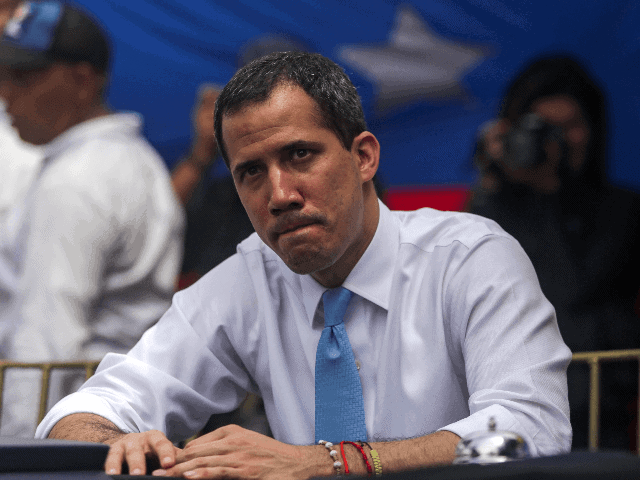Venezuela: Socialists Remove Juan Guaidó from Legislature, Call for ‘Exorcism’ of Dissidents

The ruling United Socialist Party of Venezuela (PSUV) overran the National Assembly on Tuesday, removing the only democratically elected political representatives left in the country.
The PSUV, the party of dictator Nicolás Maduro, claimed a resounding victory in the 2020 parliamentary elections held in December. Maduro not only barred most opposition parties from fielding candidates, but ordered his puppet Supreme Court to take over the two largest opposition parties and replace their leaders with socialist cronies. Many of those allowed to participate in the election boycotted; the Venezuelan polling firm Meganálisis estimated a record-low voter turnout rate of under 20 percent.
Given the illegitimacy of the election, Juan Guaidó, constitutionally the president of Venezuela and president of the National Assembly, held a parallel swearing-in ceremony in an undisclosed venue Tuesday for the lawmakers that were elected in the last free elections the country held, in 2015. Despite his legal position as president since January 2019, Guaidó has failed to exercise any power over the country. Guaidó’s legal mandate as president of the country was to organize a free and fair presidential election as soon as possible, which he has not done, calling into question for how much longer he can officially hold the title of head of state, having never been elected.
The incoming PSUV lawmakers replaced Guaidó as president of the National Assembly with Maduro loyalist Jorge Rodríguez, who called for “exorcising” the Assembly of anti-Maduro voices.
The chaotic situation leaves Venezuela with two competing presidents and two competing National Assemblies. As Maduro controls the armed forces, his supporters will most likely act as the leaders of the country in practice.
The ceremony at the National Assembly to swear in socialists “elected” in December took place as a largely bureaucratic event, whose hallmark was Rodríguez’s speech opening the new lawmaking session and taking power as Guaidó’s replacement.
“We are obligated to [an] exorcism,” Rodríguez said, referring to the anti-Maduro opposition — many of whom are also socialists — as demons. “We have to anoint every corner of these walls with holy water.”
“We have to see with alarm what has happened in this Assembly in the last five years. Reconciliation yes, but not amnesty; democratic expression yes, but not without memory. There are crimes that cannot be forgiven, they must be paid for,” Rodríguez said, presumably hinting at prosecution against opposition lawmakers and Guaidó himself.
The new president of the Assembly addressed Guaidó personally, accusing him of allegedly misappropriating nearly $2 billion without evidence. Lawmakers allied to Guaidó are currently embroiled in an ongoing corruption scandal for alleged ties to a corrupt official profiting from emergency aid, but that case involved much smaller numbers. The $1.7 billion figure appears to be a reference to gold the government in Venezuela has stored in the UK, which ruled that, as the nation’s legitimate president, Guaidó and not Maduro should have access to it.
Among Rodríguez’s other accusations against Guaidó and the mainstream opposition were claims that Guaidó had “allied himself with paramilitaries to assassinate President Nicolás Maduro” and that Guaidó “served the U.S. to steal the Esequibo from us,” referring to a Guyanese territory that Maduro insists belongs to Venezuela. While Guaidó has no known ties to paramilitary groups, Maduro has used colectivos, or socialist motorcycle gangs, to terrorize political dissidents since he took power in 2013.
Maduro applauded the return of his cronies to the National Assembly in messages on Twitter on Tuesday.
“I congratulate the installation of the new National Assembly in a historic day that opens paths of hope for our nation,” Maduro wrote. “I reiterate to its deputies my commitment and full disposition to work together for the economic recovery and consolidation of peace.”
While the National Assembly took possession, Guaidó held a “secret” ceremony with those deposed in the fraudulent December elections, vowing to continue to do their work even as they have been barred from their seats. According to the Venezuelan outlet Efecto Cocuyo, Guaidó held the event like a parliamentary meeting and achieved a quorum of 107 lawmakers and 23 substitutes.
“We are on our feet not just for the institutions and legitimate interlocution that the parliament represents, but for millions of Venezuelans who want change,” Guaido said on Twitter, suggesting his supporters would attempt to legislate without any enforcement mechanism or access to the National Assembly.
The “legitimate” National Assembly also issued a statement asserting that the group could continue to accept Guaidó as their leader and noting that most of Latin America had rejected Maduro’s National Assembly. The United States also issued a statement this week confirming it still considered Guaidó the nation’s president and those elected in 2015 the true National Assembly.
“We ask the international community to join in the defense of our people expressed so clearly by brotherly nations like the Lima Group, and not to transact with the usurpers of our freedom,” the message concluded. The Lima Group is an anti-Maduro coalition.
Guaidó had urged people to rally for massive protests on January 5, but they did not materialize.
Photo: CRISTIAN HERNANDEZ/AFP via Getty Images




